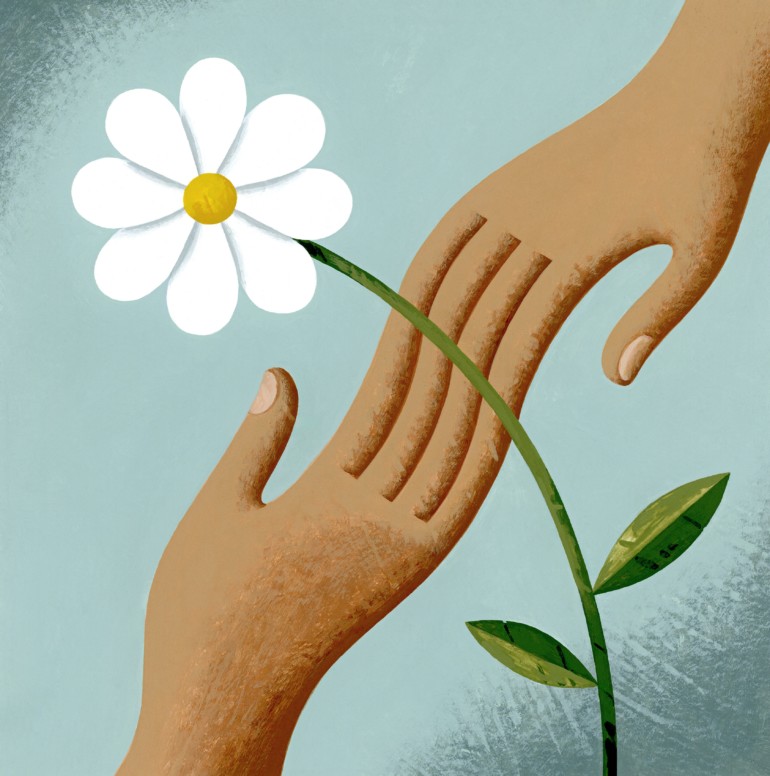The coronavirus pandemic, no doubt, has triggered all sorts of emotions over the last two months. Even those who aren’t prone to crying may feel the tears trickle down their cheeks, a result of the sadness that comes with constant news of death and hospitalization rates. Or, maybe it’s the viral videos of balcony singalongs and heartwarming salutes to hospital workers that set those tears loose.
Yet some of the emotions ushered in by COVID-19 are more difficult to translate. Answering “how are you?” has become utterly complex not only because many of us are finding that our emotions are on what seems to be an auto shuffle—not knowing what’s going to play next—but because some of these feelings are difficult to name or place.
Yet one of the most important emotional regulation skills is to pause, and identify the emotions you’re experiencing in the moment, explains Thomas McDonagh, PsyD, a San Francisco-based psychotherapist and founder of Good Therapy SF.
“This process, sometimes known as ‘name it to tame it,’ helps to make the feeling less intense,” McDonagh says.
As we began to shelter in place, I found myself grappling with an emotion that felt oddly familiar, yet uninvited: An anxiety, laced with grief. It’s a worry—maybe even dread—about what the future holds, while simultaneously mourning the way things once were, knowing that life isn’t just interrupted, but likely forever changed. Experts coin it “anticipatory grief.” And the last time I felt this knotty emotion—and really felt it, complete with the heaviness on my chest and the jitters in my stomach and the jolting awake in the middle of the night—was when my dad was diagnosed with stage IV cancer.
Grief is something we often pair with death or even divorce, so it may seem out of context right now. But even if you’re healthy, and your loved ones are safe, psychologists explain that grief may be one of the more unexpected emotions you confront during the coronavirus pandemic. As I navigate this anticipatory grief I wonder if my fertility will expire during this lockdown. When will I be able to safely visit my grandma at her memory care facility? Will the career I created as a travel writer survive this? Am I selfish for caring about these things amid a global pandemic?
Of course we all have our unique subset of “what ifs?” But, McDonagh explains, one thing that’s important is that we don’t blame or judge ourselves for the uncomfortable emotions that we feel.
“Try to remember we cannot control how we initially feel, we can only control how we respond to emotions,” he explains. “Removing the expectation that you are responsible for feeling an emotion is surprisingly relieving.”
Here, psychologists explain some of the more elusive emotions you may be feeling amid the coronavirus pandemic and how to handle these feelings.

Grief and loss
Many people are experiencing grief and loss reactions during this time but might not realize that’s what they’re feeling until it’s labeled for them, explains Dr. Logan Jones, a Manhattan-based psychologist and founder and director of the psychotherapy practices NYC THERAPY + WELLNESS and Clarity Therapy Online.
“Being able to recognize and accept the more intangible losses we face because of this pandemic can be profound,” he says.
You may be experiencing loss of community, financial stability, normalcy, future plans, he explains. You may have also lost the feeling that our world is a safe place.
“This type of grief is harder for people to identify because there’s no public funeral or formal recognition for what they’re feeling,” Jones says.
Jones suggests giving yourself permission to grieve and recognize how the loss has impacted you. It’s common to experience stages of grief just like you would if you were grieving a loved who has died, he explains. Explore and talk about what you’re experiencing with a trusted partner, friend, or therapist, Jones recommends.
Anger
Until now, things like pandemics always seemed to happen in faraway places with oceans between us, Jones says. Now, you may feel angry that this crisis has reached our shores, straining our healthcare system and overwhelming frontline workers. “There’s anger with our leadership, or the lack of leadership, the lack of action, and lack of empathy,” Jones says.
Start by acknowledging the anger, and more importantly, what’s underneath, he says. “Anger is often a mask for grief,” Jones says. He recommends allowing yourself to feel the anger and sadness and using the emotions to fuel action. How can you make a difference for someone else? Can you donate meals to frontline workers? Pick up an elderly neighbor’s groceries?
“Even if it’s just a matter of offering kindness or comfort to someone, identify how you can channel these feelings productively,” he says.
Anticipatory anxiety
People are wondering how long the pandemic will last, whether they’ll lose their jobs, if they have enough stashed away in savings, and what will happen if they get sick, Jones says.
Anxiety is often a result of ruminating about future events that haven’t happened, yet, he says. To address this, Jones suggests focusing on what you have control over in the present moment. Start with identifying one worry that is in your control and approach it with curiosity to help suss out a solution. Knowing that you have control over how much power you give to your worries can help you cope with this anticipatory anxiety.
Jack Gordon, a therapist with Cherry Hill Counseling, agrees. “This is an unprecedented event,” he says. “So much is unknown and changing every day which increases anxiety.” When we cannot control the unknown, he suggests trying to not predict the future. It’s useless and Gordon suggests our imagination can be worse than reality. “Stay focused on today. Focus on the things that you know and the things you have control over.”

Losing sense of time
You’ve probably seen memes joking about how the days are running together. Without daily commutes, gym visits, or spending time with family and friends, the days can become monotonous, Jones says.
“Life outside of confinement has also come to a screeching halt with the exception of a few industries, so for many there’s no benchmark or anchor that business and life is carrying on as usual,” he explains. “This experience of our lives essentially being frozen in time and having to wait is very unsettling, and it makes our experience of time nebulous, or mushy.”
Practicing mindfulness is exceptionally important during this time, Jones explains. An easy way to do this is pay extra attention to your sensory experiences the next time your window is open or you’re on a walk. Instead of focusing on shuttered storefronts or people wearing masks, pause and focus on Mother Nature. He also recommends keeping a small daily routine. Incorporate small amounts of structure into your day—something as simple as making sure you’re eating, waking up, and going to sleep at usual times, he says.
Therapists at The Family Institute at Northwestern University suggest accepting what you feel as a feeling, not a fact, to help practice mindfulness. “Step back and notice it, accept it, breathe, watch it move through you. Feelings are information. You have to gather quite a bit to get a useful picture.”
Impulsivity
Our body’s response to stress—commonly known as“fight or flight”—is designed to protect us from perceived, unexpected or actual threats, explains Jodi J. De Luca, PhD, a licensed clinical psychologist based in Erie, Colorado. During the COVID-19 pandemic, our fight-or-flight response has been working overtime, she explains.
“The human behavioral response to any type of threat to survival is by nature predominately emotion-based,” De Luca says. “We are feeling more than thinking. Our behavior then tends to be impulsive in nature, and, at times not in our best interest.”
Hoarding groceries or toilet paper may be an example of letting emotions dominate in a fight-or-flight response.
Knowing that we have some sense of control in life is important to the way that we manage stress. Of course, during the coronavirus pandemic, our control is limited and in many ways this inhibits how we cope with stress. De Luca recommends establishing a set of coping strategies—support from family and friends, exercise, seeking help from a professional—to help you get through this stressful time.

A final takeaway
For any emotion that you may be experiencing during this unprecedented time, Dr. Joy Lere, Psy.D., psychologist, speaker and consultant, recommends following this feeling framework.
- Acknowledge what you feel and give yourself permission to feel it.
- Express your feelings. You can process them aloud with another person or simply choose to untangle your emotions by putting pen to paper in a journal.
- Remember, you will not remain fixed in your current emotional state indefinitely. The intensity will ebb and flow like a wave.
- Feelings are important signals and can provide valuable information. You can use your emotion to spur you to action to care for yourself and care for others in a meaningful, powerful way at the current time.
How to Help:
Many are finding that helping others is an effective way to help combat feelings of powerlessness in the face of COVID-19. Here are some organizations that need your help in Chicago and the Bay Area right now.
More from Better:
- 7 Delicious Recipes That Use Up Extra Produce (And Reduce Food Waste!)
- 18 Shows to Stream Now, Based on the Ones You Already Love
- How to Maintain a Positive Mindset During a Crisis
 Brittany Anas is a freelance writer who specializes in health, fitness and travel writing. She also contributes to Men’s Journal, Women’s Health, Trip Savvy, Simplemost, Orbitz, and Eat This, Not That! She spent a decade working at daily newspapers, including The Denver Post and the Daily Camera in Boulder, Colorado, and she is a former federal background investigator. In her free time, Brittany enjoys hiking with her gremlin-pot belly pig mix that the rescue described as a “Boston Terrier” and coaching youth basketball. She also works with domestic abuse survivors, helping them regain financial stability through career coaching. Follow her on Twitter and Instagram.
Brittany Anas is a freelance writer who specializes in health, fitness and travel writing. She also contributes to Men’s Journal, Women’s Health, Trip Savvy, Simplemost, Orbitz, and Eat This, Not That! She spent a decade working at daily newspapers, including The Denver Post and the Daily Camera in Boulder, Colorado, and she is a former federal background investigator. In her free time, Brittany enjoys hiking with her gremlin-pot belly pig mix that the rescue described as a “Boston Terrier” and coaching youth basketball. She also works with domestic abuse survivors, helping them regain financial stability through career coaching. Follow her on Twitter and Instagram.

